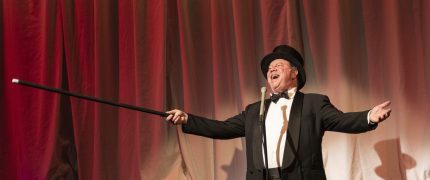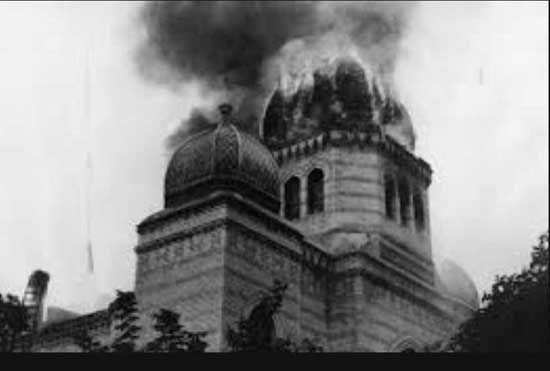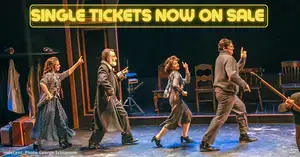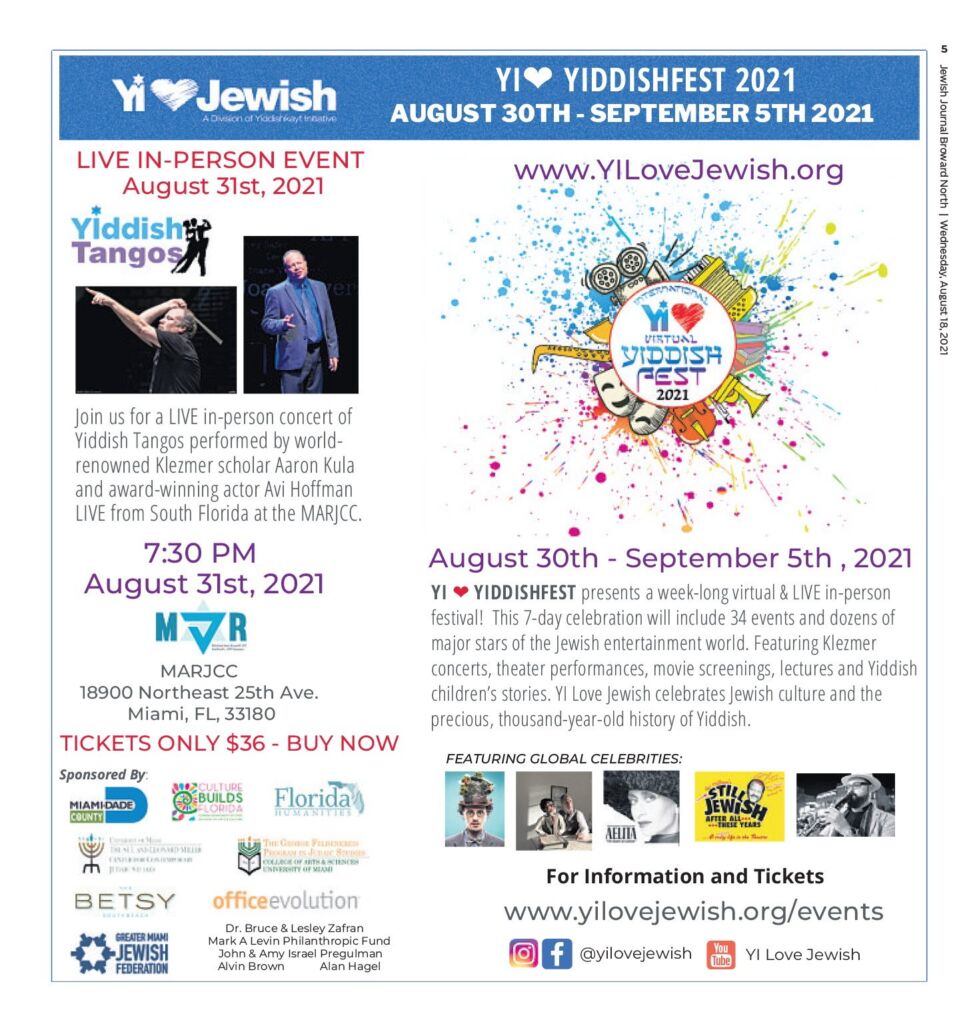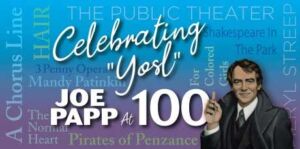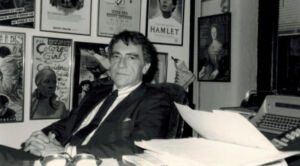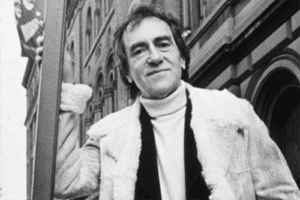You Can Live If They Let You
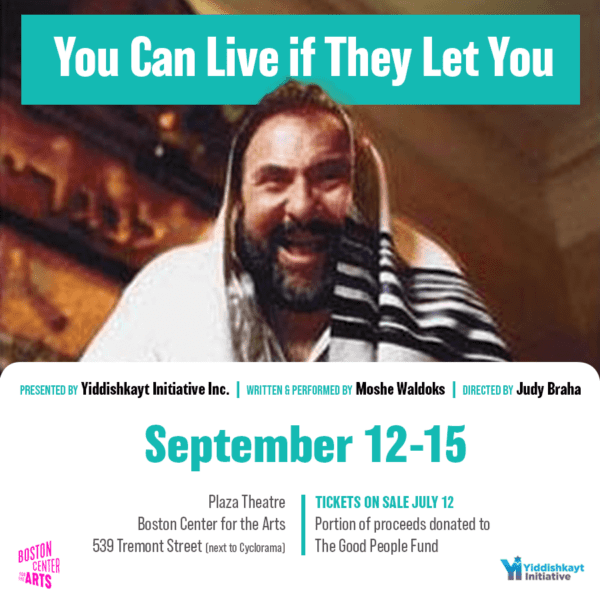 You Can Live If They Let You offers an intimate and engaging look into the life and mind of Rabbi Moshe Waldoks, a beloved figure in the Jewish community and beyond. Known for his wit, wisdom, and deep commitment to cultural preservation, Waldoks is a rabbi, author, humorist, scholar and public speaker. He is best known for co-editing the acclaimed The Big Book of Jewish Humor and for his tenure as the spiritual leader of Temple Beth Zion in Brookline, Massachusetts.
You Can Live If They Let You offers an intimate and engaging look into the life and mind of Rabbi Moshe Waldoks, a beloved figure in the Jewish community and beyond. Known for his wit, wisdom, and deep commitment to cultural preservation, Waldoks is a rabbi, author, humorist, scholar and public speaker. He is best known for co-editing the acclaimed The Big Book of Jewish Humor and for his tenure as the spiritual leader of Temple Beth Zion in Brookline, Massachusetts.
The show is a rich blend of memoir, humor, and philosophical musings, drawing on Waldoks’ unique life experiences. “I am 75 and still alive,” says Waldoks, a child of Holocaust survivors. “This show is a bit of this and a bissel of that; it’s memoirish but not a strict autobiography. I aim to offer a glimpse into my convoluted mind, a place I’m sometimes afraid to venture into after dark.”incorporating Yiddish, a language close to his heart, Waldoks’ performance reflects his deep cultural roots. “Yiddish was more than a language to me—it was a territory, a Yiddishland. I remain a mourner for it,” he notes, highlighting his lifelong dedication to keeping the language and its cultural heritage alive.
Award-winning Yiddish actor attends this year’s seminar
 The award-winning Yiddish actor and Yiddish cultural promoter Avi Hoffman will be a guest at the Yiddish Association’s summer seminar in August. He himself became involved in the theatre at an early age. Already at the age of four, he played Yiddish theater for his family, and on that path he has continued for 62 years on stages in North and South America, Israel and Europe.
The award-winning Yiddish actor and Yiddish cultural promoter Avi Hoffman will be a guest at the Yiddish Association’s summer seminar in August. He himself became involved in the theatre at an early age. Already at the age of four, he played Yiddish theater for his family, and on that path he has continued for 62 years on stages in North and South America, Israel and Europe.
Avi has also become known as a promoter of Jewish culture. Together with his mother Miriam, he started the organization Yiddishkayt Initiative (YILoveJewish.org), which promotes Yiddish, Jewish culture and Holocaust awareness by helping Jewish communities and organizations to produce various forms of cultural events.
Grew up on Bainbridgeofka
“The love of Yiddish and Yiddish culture comes with mother’s milk,” says Avi Hoffman when I catch him for an interview over WhatsApp. Both parents spoke Yiddish at their home on Bainbridge Avenue in the Bronx, New York, where a number of Yiddish-speaking young families with children moved in with the aim of allowing the children to grow up in a Yiddish-speaking environment. The street was therefore given the shtetl-sounding nickname Bainbridgeofka by the inhabitants.
“Yiddish was really my mameloshn, mother tongue, I only learned English when I started school,” says Avi.
You Can Live If They Let You
 You Can Live If They Let You offers an intimate and engaging look into the life and mind of Rabbi Moshe Waldoks, a beloved figure in the Jewish community and beyond. Known for his wit, wisdom, and deep commitment to cultural preservation, Waldoks is a rabbi, author, humorist, scholar and public speaker. He is best known for co-editing the acclaimed The Big Book of Jewish Humor and for his tenure as the spiritual leader of Temple Beth Zion in Brookline, Massachusetts.
You Can Live If They Let You offers an intimate and engaging look into the life and mind of Rabbi Moshe Waldoks, a beloved figure in the Jewish community and beyond. Known for his wit, wisdom, and deep commitment to cultural preservation, Waldoks is a rabbi, author, humorist, scholar and public speaker. He is best known for co-editing the acclaimed The Big Book of Jewish Humor and for his tenure as the spiritual leader of Temple Beth Zion in Brookline, Massachusetts.
The show is a rich blend of memoir, humor, and philosophical musings, drawing on Waldoks’ unique life experiences. “I am 75 and still alive,” says Waldoks, a child of Holocaust survivors. “This show is a bit of this and a bissel of that; it’s memoirish but not a strict autobiography. I aim to offer a glimpse into my convoluted mind, a place I’m sometimes afraid to venture into after dark.”incorporating Yiddish, a language close to his heart, Waldoks’ performance reflects his deep cultural roots. “Yiddish was more than a language to me—it was a territory, a Yiddishland. I remain a mourner for it,” he notes, highlighting his lifelong dedication to keeping the language and its cultural heritage alive.
February 28, 2024
MIAMI DADE and BROWARD COUNTIES, FL: A whirlwind of entertainment and cultural celebration awaits audiences in Miami Dade and Broward counties when YI Love Jewish presents two Purim Holiday Mini-Fest events in March. The festival promises to bring laughter, insight, and inspiration to audiences of all ages and backgrounds.
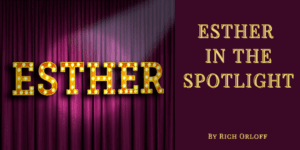 Esther in the Spotlight, by acclaimed playwright Rich Orloff, is an irreverent and hilarious retelling of the biblical story of Esther (the genesis of the Purim holiday). Described as “Mel Brooks meets The Bible,” this free concert version of Orloff’s comedic masterpiece offers more than just laughs; it delves into themes of identity, destiny, and the pursuit of meaning. With Orloff’s track record of theatrical excellence, including Critic’s Picks and international productions, audiences can expect an unforgettable evening of entertainment.
Esther in the Spotlight, by acclaimed playwright Rich Orloff, is an irreverent and hilarious retelling of the biblical story of Esther (the genesis of the Purim holiday). Described as “Mel Brooks meets The Bible,” this free concert version of Orloff’s comedic masterpiece offers more than just laughs; it delves into themes of identity, destiny, and the pursuit of meaning. With Orloff’s track record of theatrical excellence, including Critic’s Picks and international productions, audiences can expect an unforgettable evening of entertainment.
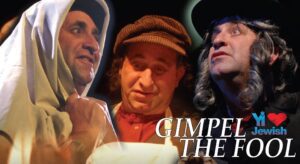
The ground-breaking one-person play and documentary film celebrating the character of Gimpel the Fool created by Nobel Laureate Isaac Bashevis Singer will star Howard Rypp of Israel’s acclaimed Nephesh Theatre Company. Featuring music by Ron Wiseman, and Singer’s text translated by Saul Bellow, the film, combined with Rypp’s live performance weaves klezmer music into a surrealistic theatrical presentation. Audiences will be captivated by Gimpel’s unwavering faith and his journey through betrayal and ridicule, inspiring reflection, and belief in human goodness. A video preview can be found here: https://www.youtube.com/watch?v=O3TkVAFHMMA
Music rejuvenates the culture, history and memories of dementia patients
 Candy Cohn used to always speak with her mother, Lillian Cohn, in English, with a few words here and there in Yiddish.
Candy Cohn used to always speak with her mother, Lillian Cohn, in English, with a few words here and there in Yiddish.Then one day, Lillian, of Delray Beach, started singing a beautiful Yiddish love song called Sheyn Vi Di Levone.
“I’d never heard her sing it. I never heard her play it. The look on her face and the joy. I hadn’t seen that in her in a long time,” Candy Cohn recalled in an interview with WLRN in talking about her mother, who passed away in 2022.
The song’s title means beautiful as the moon. Cohn started regularly playing a video of actress and performer Lisa Fishman singing this song. She didn’t expect the music to tap into a memory bank her mom still had.
“It brought back so many memories for her,” said Cohn, who owns Oasis Senior Advisors South Florida, which helps families find housing for older loved ones. “She started telling me how she first heard it, what she was doing, and when she would sing it.”
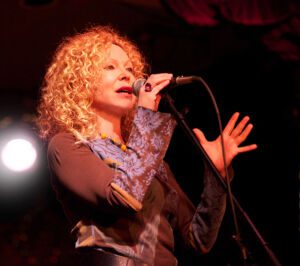
‘Silent Tears’ Spotlights Songs Inspired by Holocaust Poetry
“Silent Tears, The Last Yiddish Tango” is a musical program featuring songs inspired by the poetry of Holocaust survivors at Aventura Arts and Cultural Center 2 p.m. on Sunday, Nov. 5.
Sponsored by the Y Love Jewish organization and the city of Aventura, the program takes place on the 85th anniversary of Kristallnacht, when in 1938, Nazi leaders unleashed a series of pogroms against Jews in Germany.
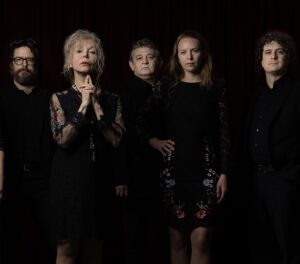
“The program is not about the specifics of Kristallnacht, but is nevertheless powerful with music that expresses the feelings of several Canadian based female Holocaust survivors who wrote poems about the brutality, torture and impending doom for being murdered, along with their families,” said Dan Rosenberg, the narrator in the program and producer of the show.
The poetry emerged from multiple support group meetings arranged over the past decade by Toronto social worker Dr. Paula David to help elderly Holocaust survivors.
“It took a long time, but the Holocaust survivors opened up their feelings, without editing or fear about the horrors of dealing with the trauma of sexual violence, forced sterilization and mental torment by writing poetry,” said David.
Rosenberg felt strongly that the poetry could be set to music to produce powerful memoirs through music to strengthen the emotions expressed by the Holocaust survivors.
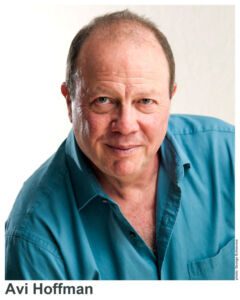
Eydish iz mayn mame-lshun (Yiddish is my native language) with Avi Hoffman
It was just a few months ago that Neo-Nazis and white supremacists paraded in front of Disney World in Orlando spreading antisemitic messages, more recently an outbreak of antisemitism on college campuses, war in Israel after a deadly Hamas attack on Jewish settlers and amidst all that Yiddish language is making a comeback due to our guest today on Specifically for Seniors.
Avi Hoffman was recently awarded Congressional recognition, was invited to the Vatican to meet Pope Francis and was inducted into the Bronx Jewish Hall of Fame for his lifetime work advancing Jewish culture, Yiddishkayt and Holocaust awareness through the charity he founded – Yiddishkayt Initiative, Inc. (YILoveJewish.org).
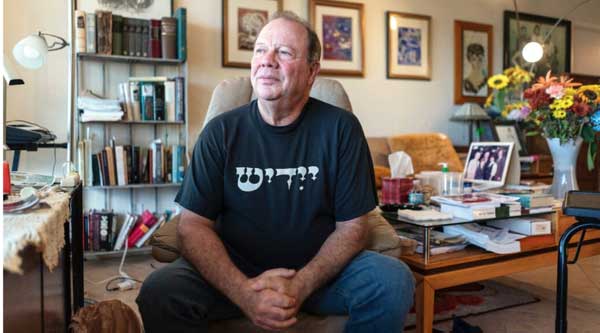
Editor’s Note: Written prior to events in Israel, Hoffman now adds:
Please stand with Israel, the land that symbolizes the enduring strength and the promise of a safe home for the Jewish people, persecuted through the centuries and today. The land whose national anthem – ‘Hatikvah’ – literally means ‘HOPE’ – the hope to be free in our own home. Let us learn from history’s darkest moments and strive for a near future where EVERY child, regardless of their nationality, background, race or faith, can grow up without hunger or fear. Where EVERY human being can pursue their greatest dreams and fulfill their highest potential destiny.
Together, we can create a world where justice prevails, love triumphs over hatred, where acceptance vanquishes prejudice and where peace prevails over war. I still believe in the power of unity and love, and I hope you will too. In a world where so much hatred still lingers, let us unite to protect the dream of a peaceful coexistence. Not only for Jews in Israel and around the world, but for all human beings on our fragile planet regardless of race, faith or gender. When all is said and done, all we have is each other.
With Hoffman’s message in mind, we should magnify our efforts to preserve the languages, cultures and traditions that have made our diverse world so memorable, including Yiddish.
Yiddish is more than one thousand years old. It was spoken by millions of Jews all around the world, as I am constantly reminded by the author of the 700 page textbook Key to Yiddish – my mother Miriam – who was Professor of Yiddish language and culture at Columbia University for 25 years. Yiddish was a thriving language in the late 19th and early 20th centuries, especially in Europe/Eastern Europe and Russia. The European centers of Yiddishkayt gave us a treasure trove of literature, music and theatre which, after migrating to the USA in the late 19th century, were responsible for the thriving Yiddish life of New York’s Lower East Side. In the USA, before WWII, Yiddish and ‘Yinglish’ were dominant forces in the culture. Dozens of newspapers and theaters, run by many strong-willed individuals, gave the immigrants a means by which they could understand the new ‘Golden Land’ and begin to slowly assimilate and lose their Yiddish identity in the famous All American ‘Melting Pot’. The enduring legacy of Yiddish Second Avenue can be found in many of today’s world cultural expressions – from the labor movement, to the Catskills, to Broadway, to Tin Pan Alley, to comedy and Hollywood. The influence of Yiddish is undeniable.
And yet, “J’Accuse…!”
I accuse the world leadership of the entire Jewish community in the 20th, and now the 21st century of actually contributing to and hastening the demise of Yiddish culture – in some cases purposefully, in others by sheer apathy and neglect. I am not suggesting that the problem lies with any one person or organization. My contention is that the problem is much more fundamental than that.
Let me begin with full disclosure. My family and I have been closely associated with Yiddish language and culture all our lives. My father, Mendl Hoffman (z’l), was a Survivor of the Auschwitz concentration camp. He dedicated long hours, days, months and years to sustaining the preservation of the remnants of Eastern European Jewish culture that had miraculously survived the Nazis, and was powerfully expressed in the Yiddish language and the concepts of ‘Yiddishkayt’: social justice, education, freedom, creativity and acceptance, to name just a few.
So where’s the crime?
The Holocaust decimated and halved the Yiddish speaking population of Europe.
Six million murdered Jews carried their Yiddish culture with them to the crematorium. Had they all survived, thrived and multiplied, imagine how many more millions of Yiddish speaking Jews would be in the world today. The Holocaust will always qualify as the greatest crime against humanity, but as the Jewish world attempted to recover, the world of Yiddish began to suffer.
Yiddish was thriving culturally well into the war years, but after the Holocaust, American Jewish leaders saw Yiddish as a language of victimization. Returning survivors were told not to speak about their experiences, and definitely not to speak that ‘dying language’. Immigrant American Jews often spoke Yiddish when they didn’t want their children to understand to ensure their assimilation and perhaps their safety from overt antisemitism. This was an enormous blow as thousands of global Yiddish schools were shut down and the breadth and depth of the culture was swept under the rug, and ignored. Only a small group of dedicated Yiddishists, some of whom are still active today, kept the dying flame lit.
Ironically, the nearly fatal attack on Yiddish was actually the miraculous creation of the State of Israel in 1948. This momentous occasion in Jewish history was a joyous celebration of the eternal survival of the Jewish people, and the creation of an eternal home for those who had been chased and persecuted throughout history. Hatikvah – the ‘hope’ of our people to return to Eretz Zion and Yerushalayim – had come true. ‘Next Year in Jerusalem’, our prayer for freedom through the centuries, had finally become a reality.
The consequences to Yiddish, however, could not have been more destructive. Suddenly the entire Jewish world became Hebrew-centric. Yiddish was exorcized from the vernacular, from the curricula, from the living world. Relegated to old European refugees and survivors and some of their children, including myself, the rich Yiddish culture was lost to mainstream Judaism in less than two generations. The language that gave us Sholem Aleichem (the basis for Fiddler on the Roof), Y.L. Peretz (Oyb Nisht Nokh Hekher), Chaim Grade (My Quarrel with Hersh Rasayner) and Isaac Bashevis Singer (Nobel Prize for Literature) was now considered obsolete and taboo by all but a few dedicated ‘Yiddishists’. Local Yiddish theatre was actually banned by the Government of Israel.
A document shown to me by Shmuel Atzmon, former director of the Yiddishpiel (National Yiddish Theatre of Israel), proves that in 1951 Yiddish theatre was banned for all local Israeli theaters – no Yiddish theatre was permitted by local Israeli artists. Only Yiddish performers from outside the country were allowed.
Meanwhile in the USA, Yiddish organizations – es-pecially those active in the performing arts – were neglected and left to their own resources. To this day I am dismayed at how many were left with no funding and virtually no support system.
And yet Yiddish thrives… Consider the recent success of the Yiddish Fiddler on the Roof production in NY, the multiple award winning TV shows like Shtisl and Unorthodox, and Yiddish films like Shehita and Boxed. Having performed as Willy Loman in the highly acclaimed New York Yiddish production of Death of a Salesman, I am stunned by the parallels between Willy’s demise and the near death experiences of Yiddish.
Iz es beser tzu leybn un mutchn zikh far gornisht?
Is it better to live and destroy yourself for nothing? This is the final lament of Willy, as he decides that death is preferable to this life; that with his demise, he is doing the noble thing for his family and the world.
This profound concept makes me think about the Yiddish language in general and Yiddish theatre in particular, which have been ‘dying’ for centuries. This 1000+ year-old language that has given the world some of its greatest writers, playwrights, poets and composers, and a culture which survived the devastations of Stalin and Hitler has found itself orphaned and abandoned by the very people who claimed to care for it. The Yiddish world, which helped create the labor unions, the thriving theatre community, the worlds of film, music and comedy, now finds itself alone and forsaken like so many of our elderly, not to mention the destitute Holocaust survivors around the world. Death of a Salesman in Yiddish received no support from the mainstream Jewish or theatre institutions, but the production company of dedicated actors, designers, directors and staff were on a mission to uphold a tradition that, like the Yiddish language itself, refuses to die.
As I contemplate these matters, I am enlightened by the realization that in our society today we celebrate ‘Super Heroes’ – those with superpowers that will save us from the ‘evils’ surrounding us. My revelation is that I already possess the greatest ‘SuperPower’ of all – I can speak Yiddish, the exalted language of ‘survival’. Just as Yiddish has been prophesied to die for the vast majority of its existence, and yet survives and thrives, so have I been given the ability to endure the hardships that have challenged my life in preserving this beautiful language: to wake up every morning and see the possibilities that present themselves to protect this treasured culture. I am encouraged by the worldwide renaissance of Yiddish and Yiddishkayt in the 21st century, as evidenced by the many sold-out performances, and virtual participation of millions worldwide, of global Yiddish/Yiddishkayt events. We Jews have eternal hope… And Zoom.
Perhaps, with Mazl, Yiddish will continue to thrive in the face of overt rising antisemitism and organizational leader’s apathy. Perhaps all those who appreciate ‘Yiddishkayt’ today will support the organizations whose missions include protecting, preserving and presenting our ‘Super Power’ – Yiddish.
Amid rising antisemitism, the vivid language of Yiddish makes a comeback
“Verter zol men vegn un nit tseyln,” says Hoffman, an actor who co-founded the cultural nonprofit Yiddishkayt Initiative, slowly reciting the proverb that translates to “Words should be weighed, not counted.”
His students repeat after him from various parts of the country, delving into a world they only knew in snippets while growing up yet now see as central to their identity.
The trends aren’t directly connected, say those encouraging the revived interest in the language as well as other aspects of Jewish life. But for some, its growing popularity beyond mainstream terms such as “schlep” and “klutz” has become a kind of defiance against feelings of being perpetually under siege.

“We have to stand up because, you know what? We’ve already seen this movie,” Hoffman said, alluding to the early 20th century prejudices that led to the Nazi Holocaust and the deaths of 6 million Jews.
In New York, a Brooklyn-based chef runs a “Gefilteria” website offering artisanal gefilte fish for sale along with cooking classes and catering that offer spins on other Eastern European staples.
And upstate, the Borscht Belt Museum celebrates the golden era of the Catskills during the early- to mid-20th century, when millions of vacationing Jewish families decamped during the summers to the far cooler patchwork of resorts and farm land 90 miles north of New York City that became known as “the Jewish Alps.”

During that period, lionized in the movie “Dirty Dancing” and the TV comedy-drama “The Marvelous Mrs. Maisel,” antisemitism was so rampant that Jews were barred from most hotels. The resorts were a refuge from that bigotry and became a cradle for live music and stand-up comedy that left a deep imprint on American culture.
The recent waves of antisemitism have coincided with increased donations, according to journalist Andrew Jacobs, who is leading the museum effort in the village of Ellenville. Its future plans include a film festival and classes on how to make chocolate babka pastries.
“I think some Jewish people really feel motivated now to show and celebrate our culture,” he said. “I hate to sound glib, but it’s harder to hate people when you are laughing at their jokes.”
Combating hatred and even violence can feel ever more daunting, though. Nearly 3,700 antisemitic incidents were reported last year in the United States, a 36 percent increase from 2021 and 82 percent higher than 2020, according to the Anti-Defamation League’s Center on Extremism.
Certain groups “have entire podcasts where they replay all their activity and monetize it,” said Carla Hill, the center’s senior director of investigative research. “That’s what is so concerning. When you’re doing that form of entertainment — hate for entertainment — how far do you have to keep going to continue to build that following and keep them entertained?”

Florida has been a hot zone, with almost 40 neo-Nazi demonstrations since January 2022 and more than 100 instances of antisemitic fliers being left on residents’ doorsteps. The incidents have intruded on the presidential campaign of Gov. Ron DeSantis (R), who has been criticized for not condemning them more forcefully.
Rabbi Rachael Jackson, who leads the Congregation of Reform Judaism in Orlando, tries to reassure her families and remind them that many elected officials and law enforcement have denounced such ugly displays.
“We’ve had to be pastoral and reassuring that we’re not there. This isn’t Germany of the 1930s,” Jackson said. At the same time, the reality is that her synagogue and many others posted security guards outside their buildings during Rosh Hashanah services last weekend and will do so again for Yom Kippur. “We have to be very cognizant that hatred is on the rise, that we’re not making this up.”
Across the country, a “Yiddishland” cultural center in San Diego, raising funds to re-create an Eastern European shtetl, or village, that will double as an immersive hotel for guests, featuring Yiddish-themed breakfasts and a venue for Yiddish weddings. The two-year-old center already offers Yiddish classes, a Yiddish theater academy, klezmer music performances, and a gallery with artifacts and paintings on Jewish themes by Yiddish-speaking artists.
Director Jana Mazurkiewicz Meisarosh said she created Yiddishland primarily out of a sense of nostalgia for a language that her grandmother spoke but that she didn’t understand while growing up in Poland, an experience common to descendants of Holocaust survivors. Yiddish was largely phased out after World War II — many associated it with victimhood and defeat — particularly with Israel’s embrace of Hebrew as its official national language. About 250,000 Jews in the United States speak Yiddish; most are Orthodox and consider Hebrew too sacred for everyday use.
Over time, she noticed that non-Jews were also visiting the center, including her 6-year-old daughter’s African American and South Asian schoolmates. She realized Yiddishland’s value as a tool to counter antisemitism.

“People fear what they don’t know,” she said. “If they can come here and learn. It’s a powerful weapon. It has to become part of mass culture.”
Some Yiddish vocabulary is already ingrained in that broader culture — words such as chutzpah (meaning gall), mensch (a good, decent person) and oy (often conveying exasperation).
But the 1,000-year-old language is infinitely rich, even whimsical. Several of the 15 students who joined a recent online “Yiddish Lite” introductory class laughed at the expressions shared by teacher Alan Davis.
“Menschen trakht aun Got lakht,” he explained, means “Man plans, God laughs,” while “a shanda aun a kharpa” translates into “a shame and disgrace,” usually uttered when something disagreeable happens.
“My mother used to say that to me all the time, and I never understood what she was saying,” Davis told his students from his home in northern New Jersey. “It’s a good one to know. Oy, vey. A shanda aun a kharpa! What are you doing?”
As a child, Davis began teaching himself Yiddish to understand his father’s off-color jokes. His class, offered through the Federation of Jewish Men’s Clubs, is meant to invite beginners in through songs and stories.

The discussions don’t address the worries of the day. Rather, they delve into the traditions and words that students learned while growing up in the 1950s and 1960s. “They’re glomming onto something Jewish in the songs, in the stories, in the expressions, in certain Yiddish words. And this gives them a connection to their heritage,” he said.
Several students in a class this month confirmed that explanation as their motivation, admitting to some frustration over not being taught the language by their parents or grandparents.
“I see kids that are high school age who may speak Spanish or Korean or Chinese at home, and they’re fluent,” said Howard Kaye, who lives in Northern Virginia. “But the Jewish kids didn’t speak Yiddish when they were in high school.”
Renata Lantos was a young child when her family fled Europe during the Holocaust. She signs onto the Yiddish class from her home in Connecticut to hear her parents’ voices again.
“It was my first language,” Lantos said. “If we don’t do something to preserve it, it’s going to be gone.”
About U.S. is a forum to explore issues of race and identity in the United States.
A ROMANTIC MUSICAL COMEDY SPOTLIGHTING THE CONFLICTS AND AFFECTIONS OF JEWISH IMMIGRANTS TO AMERICA AND THEIR AMERICAN BORN CHILDREN.
The beloved turn of the 20th century tale “The Imported Bridegroom” by Abraham Cahan is set to take the stage in a brand new musical, starring Avi Hoffman. This WORLD PREMIERE musical adaptation is by Pamela Berger, with music by the iconic Klezmer composer Hankus Netzky, the company includes choreography by acclaimed Israeli choreographer Oren Korenblum, musical direction by the inimitable NY musical icon Mark York with direction by Avi Hoffman.
This exciting production brings to life the timeless story of the challenges faced by Jewish immigrants to America in the early 20th century. The story follows the journey of Asriel, a wealthy landlord seeking ‘entry’ to heaven by supporting a young immigrant named Shaya, who is a pious Talmud student ‘imported’ from his small shtetl in Eastern Europe to the bustling streets of New York City to marry Asriel’s daughter.
Eleanor Reissa’s THE LAST SURVIVOR Play Reading To Explore Post-Holocaust, Modern Jewish Life
This presentation is part of the YI Love Play Readings 2022-2023 season and promises to be a captivating exploration of Jewish life in the United States.
“The Last Survivor,” a play reading from the anthology by Tony Award-nominated director, playwright, and actress Eleanor Reissa, is set to take place on Wednesday, April 19, 2023 at 7:30pm at the Levis JCC Boca Raton and on Thursday, April 20, 2023, at 2:00 pm at the Alper JCC Miami. This presentation is part of the YI Love Play Readings 2022-2023 season and promises to be a captivating exploration of Jewish life in the United States. Broadway stars Eleanor Reissa (Indecent) together with Joe Delafield, Dani Marcus, Bruce Linser, Laura Turnbull, David Kwiat and Avi Hoffman will be participating in this important reading. Each reading will be followed by a Q&A with the playwright and the actors.
Broadcaster Arlene Herson Will Be Honored At A Silent Auction
The event will take place on March 22nd.
Broadcaster/journalist/philanthropist Arlene Herson will be honored at a Silent Auction on March 22nd. The event, which will take place at Boca Raton’s Gallery 22, will be co-sponsored by the gallery and YI Love Jewish. The proceeds from the auction will benefit YI Love Jewish’ mission to fight antisemitism through the arts.
The Silent Auction will be hosted by Yaacov and Sue Heller and will feature works by a number of world-renowned artists including Laurence Gartel (Father of Digital Art), Martin Levin (Kristallnacht Series), Frank Stumer, Sir Kelly Fawaz, and Yaacov Heller.
Award-winning performer and YI CEO Avi Hoffman will act as master of ceremonies and pianist Phil Hinton will provide live music during the evening.
YI Love Jewish To Present Free Readings Of Josef Mundi’s IT’S GOING AROUND
Hebrew thriller It’s Going Around by Josef Mundi, for audiences in Boca Raton and Miami Beach on March 26 and March 28.
As part of the YI Love Play Reading Series, YI Love Jewish will present Avi Hoffman‘s English translation of the controversial Hebrew thriller It’s Going Around by Josef Mundi, for audiences in Boca Raton and Miami Beach on March 26 and March 28, 2023.
An award-winning Israeli psychodrama about idealism, identity, and insanity, It’s Going Around speculates as to what happens when Dr. Theodore Herzl, the Father of Zionism and the concept of a Jewish State in Palestine, meets Franz Kafka, noted author, playwright and assimilated Jew, in an insane asylum in modern-day Israel. This play is the only one in the history of the State of Israel to be shut down by the authorities in the 1960s; it was eventually reinstated by the Israeli Supreme Court, and ultimately became one of the most important and successful plays in the history of Israeli Theatre.

Broadcaster/journalist/philanthropist Arlene Herson will be honored at a Silent Auction on March 22nd. The event, which will take place at Boca Raton’s Gallery 22, will be co-sponsored by the gallery and YI Love Jewish. The proceeds from the auction will benefit YI Love Jewish’ mission to fight antisemitism through the arts.
Batsheva Concert and Play Reading Highlight Hanukkafest ’22
Next week, Hanukkah will be celebrated by the YI Love Jewish organization at the Miami Beach Jewish Community Center in the third annual HanukkahFest ’22 with a staged reading of the play “Nobel Laurente: Mr. Singer And His Demons” by co-authors Miriam Hoffman and Rena Berkowicz Borow.
That’s set for Wednesday, Dec. 21 and then a concert featuring songs in English, Hebrew, Ladino and Yiddish by Batsheva on Thursday, Dec. 22.
The third annual HanukkahFest staged reading at the Miami Beach JCC will also be performed at the Levis Jewish Community Center in Boca Raton on Tuesday, Dec. 20 and the concert by Batsheva will be at the Levis JCC on Wednesday, Dec. 21.
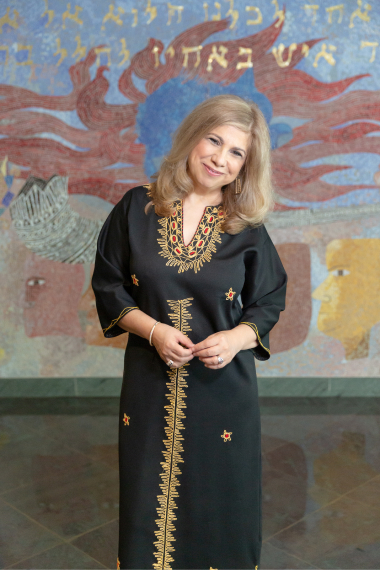
Batsheva
HanukkahFest ’22 and the YI Love Jewish organization is founded, guided and inspired by actor Avi Hoffman, known to South Florida audiences for decades for his one-man funny music shows such as “Too Jewish”, Too Jewish Two” and “Still Jewish After All These Years”, all which he wrote and performed, among other plays in South Florida.
The 64-year-old actor is especially enthusiastic about the growth of Yiddish and it use in both Miami Beach JCC events at HanukkahFest ’22..
“Yiddish is my mother tongue. Being a child of Holocaust survivors, I was brought up with the depth of Yiddish culture, language which is a legacy which will continue to grow and flourish,” says Hoffman.
“Hanukkah is a time of miracles. What we are doing is bringing together Batsheva, who performs songs in Yiddish and the play reading co-written by my mother (Miriam Hoffman) and Rena Berkowicz Borow, about the great Yiddish writer and Nobel Prize winner Isaac Bashevis Singer,” he says.
Fighting Antisemitism through the Arts: Yi Love HANUKKAHFEST ‘22
 YI Love Jewish (Yiddishkayt Initiative, Inc) will celebrate Hanukkah by presenting live events in South Florida with a ‘miraculous’ gathering of Jewish celebrities.
YI Love Jewish (Yiddishkayt Initiative, Inc) will celebrate Hanukkah by presenting live events in South Florida with a ‘miraculous’ gathering of Jewish celebrities.
Almost everyone knows the ancient miracle of Hanukkah: a drop of oil that should have lasted only one day but instead lasted for eight days to light the menorah in The Holy Temple after the Maccabees re-claimed it from the Greeks.
As Hanukkah is a season of miracles for Jews all around the world, YILoveJewish.org, is presenting their 3rd annual YI Love HanukkahFest from December 20-December 24 with a LIVE lineup of entertainment and educational programming that is nothing short of miraculous after the long Covid winter.
“Hanukkah is a time of miracles,” said Avi Hoffman, YI Founder and CEO. “What we are doing is bringing together leading Jewish and Yiddish cultural figures from all over the world for this year’s YI Love HanukkahFest ‘22. Some of the festival’s events are free to the public because our mission is to fight antisemitism through the arts.”
The festival opens with a reading of the play “Noble Laureate: Mr. Singer & His Demons” by Miriam Hoffman & Rena Berkowicz Borow, starring Avi Hoffman as the Nobel prize-winning author Isaac Bashevis Singer, who spent the last and most productive years of his life on Miami Beach. This play explores the parallels between Singer’s family members and some of his fictional characters while navigating the complex mindset which gave rise to Singer’s creative genius.
The headliner for this year’s festival is award-winning singer/songwriter/musician Batsheva who will be performing her internationally acclaimed one-woman concert. Born and raised in Toronto, Canada, Batsheva performs music in Yiddish, Ladino Hebrew and English and is frequently featured on Raquel Zucker’s Yiddish radio and other Jewish radio shows in the USA while touring and performing around the world.
The festival closes with an encore performance of “Stars of David” presented by YI Love Jewish and Temple Torat Emet in Boynton Beach. The concert, based on the best-selling book, “Stars of David: Prominent Jews Talk About Being Jewish” by Abigail Pogrebin, features Musical Director Caryl Fantel and singers Shira Ginsburg, Eytan Deray and Avi Hoffman. “Stars of David” adapts the stories of well-known Jewish personalities into humorous and touching songs.
From Miami Beach To Boca, ‘Yiddish Fest ’22’ Celebrates A Culture For Both Young and Old
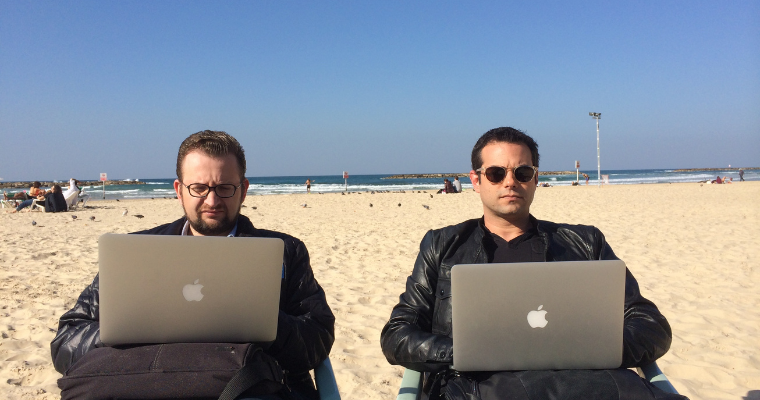
“Yidlife Crisis” duo Eli Batalion, Jamie Elmance on the beach with computer laptops from the YouTube “Yidlife Crisis” video web series.
The fourth annual, six-day YiddishFest ’22 kicks off Tuesday with multiple events celebrating the Yiddish language through concerts, staged readings, comedy sketches on stage and video plus comic monologues. The events begin on Tuesday, Aug. 30 and run through Sunday, Sept. 4 at venues in Miami Beach, North Miami Beach, Boca Raton, and Coral Springs.
The YiddishFest is founded, guided and inspired by actor Avi Hoffman, known to South Florida audiences for decades of his one-man shows such as “Too Jewish, Too Jewish Two,” which he both wrote and performed in addition to productions across South Florida.
The 64-year-old actor is especially enthusiastic about the growth of Yiddish. “Yiddish is my mother tongue. Being a child of Holocaust survivors, I was brought up with the depth of Yiddish culture, language which is a legacy which will continue to grow and flourish,” said Hoffman.
“As I joked in ‘Too Jewish,’ over 300 years ago, historians predicted the death of Yiddish. Those historians are dead. Yiddish is thriving. The future of Yiddish is bright.”
 The 4th Annual Yi Love Yiddishfest ’22 Returns Live This Year!
The 4th Annual Yi Love Yiddishfest ’22 Returns Live This Year!
August 30th – September 4th, 2022
The event brings six days of cultural events, including concerts, plays, lectures, and live entertainment, after two years of online events due to the COVID-19 pandemic.
Founded by actor/comedian and Coral Springs resident Avi Hoffman (known for his “Too Jewish” trilogy) who’s CEO of the Yiddishkayt Initiative and YI Love Jewish, the first event was held in 2018 at the Colony Theatre in Miami Beach. This year’s events will take place Broward County, Boca Raton, and Miami Beach.
The 4th Annual Yi Love Yiddishfest ’22 Is Live In South Florida
August 30th – September 4th, 2022
South Florida, FL – The 4th Annual YI Love YiddishFest ’22 (yiddishfest.org) is a six-day extravaganza of comedy, concerts and plays with contemporary Jewish celebrity headliners such as YidLife Crisis, Kosha Dillz, Avi Hoffman and a concert version of the NY hit musical Stars of David. With over ten events in all three South Florida counties, there’s something for the entire mishpukhe (family) to enjoy!
YidLife Crisis and Kosha Dillz are contemporary Jewish personalities and performers who have gone viral with their comedy and music videos.
Viewed by millions, Yidlife Crisis has collaborated with Mayim Bialik, Howie Mandel and many other Jewish celebrities. Kosha Dillz has performed with some of the top names in the world of Hip-Hop and Rap, including Fat Joe, Nissim Black and many others. His unique Jewish take on hip-hop has him participating in many shows including Nick Cannon Presents: Wild ‘N Out, Madison Square Garden TV and international festivals and venues.
(1).png?ezimgfmt=rs:300x393/rscb26/ng:webp/ngcb26) YiddishFest ’22
YiddishFest ’22
The 4th Annual YI Love YiddishFest ’22 (yiddishfest.org) is a six-day extravaganza of comedy, concerts and plays with contemporary Jewish celebrity headliners such as YidLife Crisis, Kosha Dillz, Avi Hoffman and a concert version of the NY hit musical Stars of David.
With over ten events in all three South Florida counties, there’s something for the entire mishpukhe (family) to enjoy!
YidLife Crisis and Kosha Dillz are contemporary Jewish personalities and performers who have gone viral with their comedy and music videos. Viewed by millions, Yidlife Crisis has collaborated with Mayim Bialik, Howie Mandel and many other Jewish celebrities. Kosha Dillz has performed with some of the top names in the world of Hip-Hop and Rap, including Fat Joe, Nissim Black and many others. His unique Jewish take on hip-hop has him participating in many shows including Nick Cannon Presents: Wild ‘N Out, Madison Square Garden TV and international festivals and venues.
 Yi Love Jewish Presents JEWSICAL! BROADWAY’S JEWISH COMPOSERS FROM SONDHEIM TO SCHWARTZ With Joshua Turchin
Yi Love Jewish Presents JEWSICAL! BROADWAY’S JEWISH COMPOSERS FROM SONDHEIM TO SCHWARTZ With Joshua Turchin
The virtual show will stream on July 12 at 7:00pm EST.
Enjoy a musical journey of influential Jewish composers who have left indelible marks on the history of Broadway with performer, musician, and composer Joshua Turchin. Hosted by YILoveJewish, the approximately 45 minute virtual show curated, written, sung, and played by Turchin is a delight for all ages to enjoy.
GableStage presenting BOCA a not-to-be-missed comedy
 GableStage is presenting Boca by Jessica Provenz, a not-to-be-missed comedy about how a group of saucy retirees come together in the fictional gated community of Royal Oasis in Boca Raton.
GableStage is presenting Boca by Jessica Provenz, a not-to-be-missed comedy about how a group of saucy retirees come together in the fictional gated community of Royal Oasis in Boca Raton.
Directed by Julianne Boyd, the legendary artistic director of the Berkshire’s Barrington Stage Company, Boca continues to May 22 and is available for streaming from Apr. 27 to May 22.
Described as “funny and… surprisingly touching” by The Wall Street Journal, Boca delivers laughs.
Pictured (l-r) are cast nembers: Deborah Kondelik, Barbara Bonilla, Robert Zukerman, Beverly Blanchette and Avi Hoffman.
(GableStage photo by Magnus Stark)
ROM 2ND AVENUE TO TIMES SQUARE – HOW THE YIDDISH THEATER INFLUENCED BROADWAY
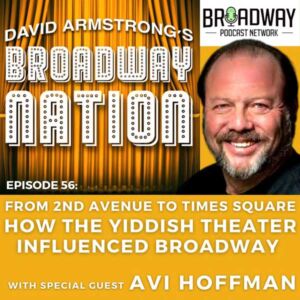 On this episode my guest is acclaimed actor, singer, writer, producer and director Avi Hoffman who specializes in Jewish culture and Yiddish theater. His long running off-Broadway “Too Jewish” trilogy has been seen by millions on PBS and at theater venues around the world, and in 2016 he received rave reviews and a Drama Desk nomination for his performance as “Willy Loman” in the Yiddish language production of Death of Salesman. He is also the founder and CEO of the Yiddishkayt Initiative — a non-profit organization dedicated to preserving Jewish culture.
On this episode my guest is acclaimed actor, singer, writer, producer and director Avi Hoffman who specializes in Jewish culture and Yiddish theater. His long running off-Broadway “Too Jewish” trilogy has been seen by millions on PBS and at theater venues around the world, and in 2016 he received rave reviews and a Drama Desk nomination for his performance as “Willy Loman” in the Yiddish language production of Death of Salesman. He is also the founder and CEO of the Yiddishkayt Initiative — a non-profit organization dedicated to preserving Jewish culture.
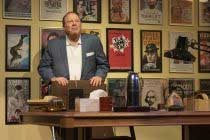 ‘Joe Papp at the Ballroom’ offers an up-close look at a legend
‘Joe Papp at the Ballroom’ offers an up-close look at a legend
Joe Papp would have turned 100 this year, it is a good time to pay homage to the late legendary producer. His philosophical tenant was “theater for all.” Actually, Papp believed that live theater should be like the public library — free and open to all.
YI Love Jewish To Present THE GOSPEL ACCORDING TO JERRY
This funny, poignant new play takes a hard-hitting look at contemporary values, Jewish – African American relations, stereotypes, and spirituality.
Avi Hoffman Pays Tribute To Theater Icon Joseph Papp
Attention must be paid, to steal a line, and Avi Hoffman is ensuring that proper homage is paid to Joe Papp, the visionary who intersected art and community by making theater accessible to the general public in comprehensibility, neighborhood performances and free admission.
THEATER LEGEND SINGS AND REMINISCES IN GABLESTAGE WORLD PREMIERE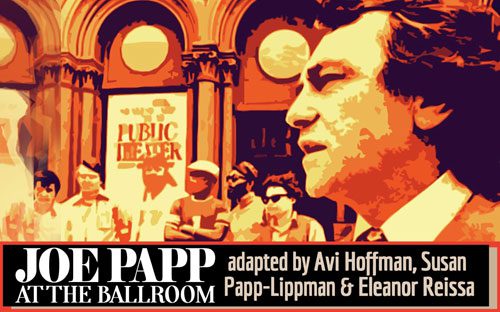
The GableStage world premiere of “Joe Papp at the Ballroom” aims to remind audiences of the influential impresario’s legacy. (Graphic courtesy of GableStage)
Just looking at actor-singer Avi Hoffman — creator and star of the popular “Too Jewish” shows, as well as a Carbonell Award winner for playing the adoring hubby in “Hairspray” at Actors’ Playhouse — you wouldn’t necessarily think of casting him as visionary New York Shakespeare Festival founder Joseph Papp.
As Chanukah is a season of miracles for Jews all around the world, the Yiddishkayt Initiative (YILoveJewish.org), is presenting a virtual Chanukah Mini Fest from Nov. 28- Dec. 5 with a lineup of entertainment and educational programming that is nothing short of miraculous.
Jamaal Bowman meets Yair Lapid in Israel • The new Jew on ‘Succession’ • Writer Stuart Schoffman dies
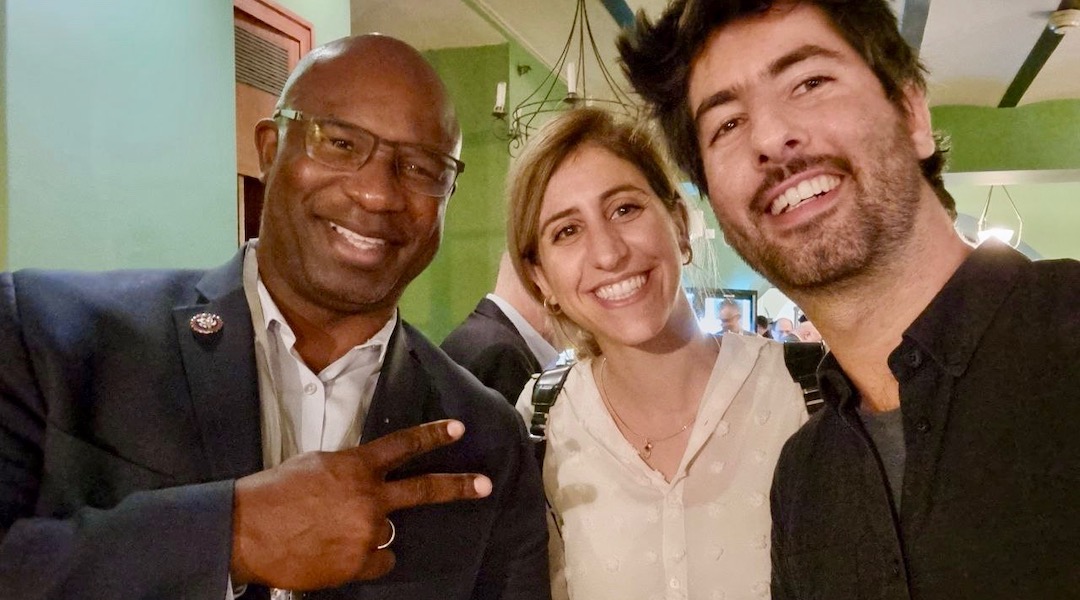
Single-Ticket Sales Are Available Now From GableStage With Streaming Options
For the first time, select productions will become available for streaming during the second week of performances.
YI Remembers… Announces World-Premiere Play Reading Of Yale Strom’s THE EDUCATION OF HERSCHEL GRYNSZPAN
The Education of Herschel Grynszpan, based on true historic accounts, is a story about two passengers sharing a train from Krakow to Warsaw on November 1, 1938
International YI LOVE YIDDISHFEST 2021 To Feature Live and Virtual Online Events
The programming for the YI Love YiddishFest will consist of a wide variety of events over seven days.
L'Chaim
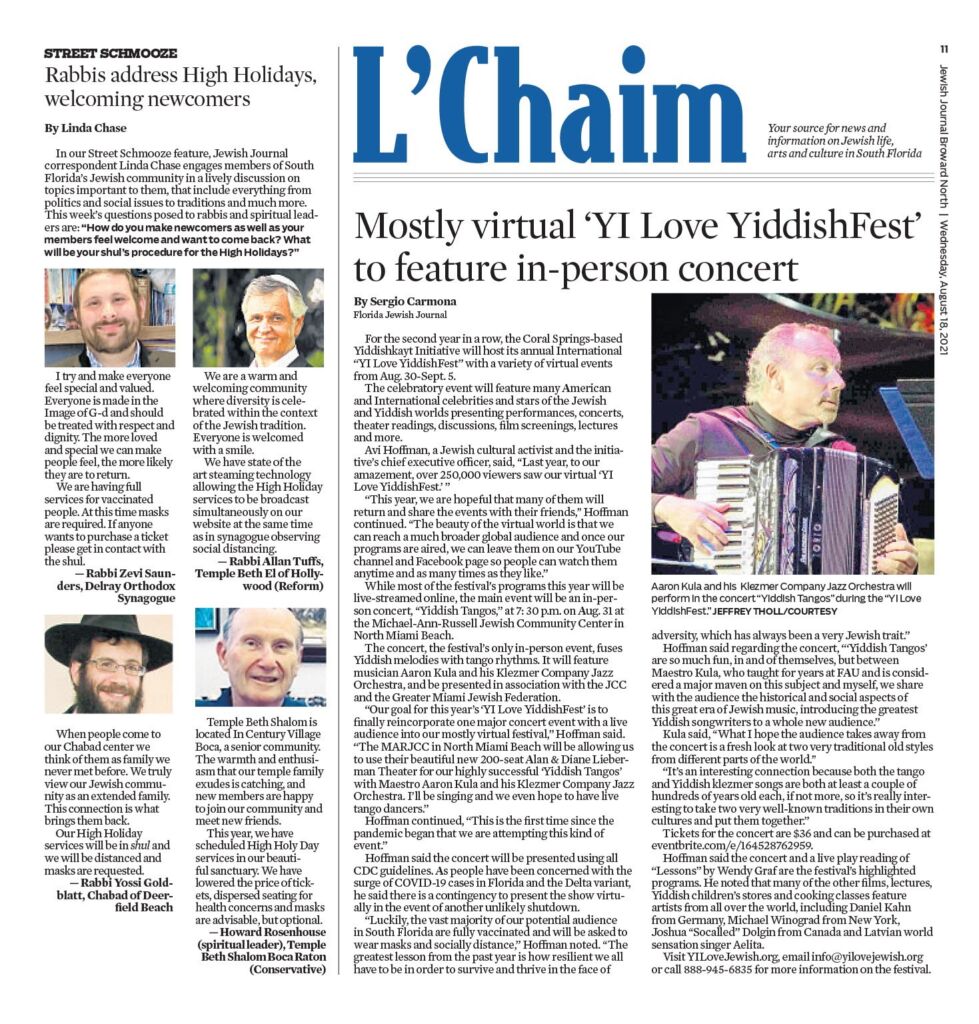
Jewish Culture Organization Opens Headquarters In Coral Springs
YI Love Jewish said they are thrilled to spread its mission of creating, learning, and engaging with Jewish culture in Coral Springs.
The non-profit organization just opened its headquarters inside Office Evolution of Coral Springs, thanks to the franchise owner, Mark Mendel.
Celebrating ‘Yosl’: Joe Papp at 100
Players Circle Performing Arts Center at the Shell Factory is proud to announce its partnership with the Jewish Federation of Lee and Charlotte Counties and YI
Avi Hoffman plays Papp in “Joe Papp at the Ballroom,” which is showing at the Players Circle theater at the Shell Factory in North Fort Myers from June 25-26.
“Celebrating Yosl – Joe Papp at 100″ is a commemorative full day of live, virtual and pre-recorded events celebrating Papp, who was born Yosl Papirofsky, on June 22. It begins at 11 a.m. and continues into the evening.
The Broadway Blog:
THEATER ICON JOE PAPP, CREATOR OF NEW YORK SHAKESPEARE FESTIVAL AND THE PUBLIC THEATER, TO BE REMEMBERED AND HONORED AT 100TH BIRTHDAY COMMEMORATION
YI Love Jewish to Host “Celebrating ‘Yosl’: Joe Papp at 100” featuring a full day of live and virtual star-studded events and celebrity testimonials
Celebrating ‘Yosl’: Joe Papp at 100 Will Feature Renowned Actor/Singer Mandy Patinkin, The Public Theater Artistic Director Oskar Eustis and Papp Biographer Helen Epstein, among others on June 22, 2021



